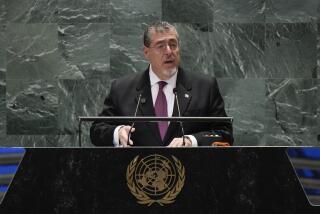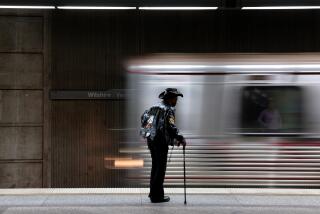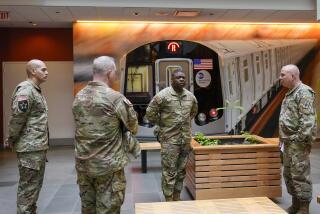Combat Troops to Patrol Streets in Soviet Cities
- Share via
MOSCOW — Armed troops will join police in patrolling the streets of the Soviet Union’s major cities next week to combat rising street crime, the Kremlin announced Friday.
In a joint order by the Soviet ministers of defense and of internal affairs, the government said that law and order are deteriorating even more rapidly than before, that criminals are now well armed and that “grave crimes of a vicious and cynical nature” are increasing.
The new directive from Defense Minister Dmitri T. Yazov and Interior Minister Boris K. Pugo said that the measure is a “concrete answer to demands of Soviet people for strengthening legality and order in the country, faithfully ensuring the safety of every citizen.”
But the deployment of armed combat troops, who will be supported by armored cars and other military units, is certain to heighten the fear of further clashes between the army and civilians, particularly in the country’s troubled areas such as the Baltic republics.
Edgar Savisaar, the prime minister of Estonia, one of the three Baltic republics seeking independence from the Soviet Union, immediately warned that most people will see the move as a step toward a military dictatorship.
Zigmas Voisoila, the deputy prime minister of Lithuania, another Baltic republic, said that the joint order, signed nearly a month ago but acknowledged only Friday, shows “a military dictatorship really is in full swing.”
And the move recalls the warning of Eduard A. Shevardnadze, the Soviet foreign minister, when he resigned a month ago saying that the country was sliding toward a right-wing dictatorship, probably dominated by the military, and that President Mikhail S. Gorbachev would be pushed aside.
Although the order emphasizes that the patrols will operate under civil laws, the deployment of armed troops will give the country’s major cities the look and perhaps the feel of a nation under martial law when they begin next Friday.
“Any insinuations about these measures can only come from people pursuing improper goals,” the two ministers said in a statement read on national television.
Victims of the latest shootout--between Latvian policemen supporting their pro-independence government and police commandos still loyal to Moscow--were buried on Friday in Riga after a funeral attended by an estimated 100,000 Latvian nationalists.
In a previous confrontation, army paratroopers attacked and seized the Lithuanian broadcast center in Vilnius, leaving 14 people dead. In a new incident Thursday, the Soviet military in Lithuania accused Lithuanians of shooting first in an incident Thursday in which one person was wounded.
Altogether, 20 people have been killed in clashes with military and paramilitary forces this month.
Valery Myasnikov, a defense ministry spokesman, explained the new move, however, not in terms of battling separatism or containing unrest but of reducing ordinary street crime and reestablishing law and order in Soviet cities.
The government does not have enough policemen and internal security forces to cope with rising crime, Myasnikov said, and it proposed the joint patrols to the armed forces as a solution until crime has been brought under control and more policemen have been trained.
“At the present time, the Interior Ministry cannot maintain control relying on its own forces,” Myasnikov said. “That is why we decided to set up joint patrolling with the Defense Ministry.”
Preliminary figures for 1990 showed that murders, rapes and severe bodily injuries rose 12% over 1989, which in turn had increased nearly 30% over 1988.
The Interior Ministry, the chief law enforcement agency in the Soviet government, controls the police but the army already has soldiers patrolling some cities. Joint patrols would give the authorities a more powerful, flexible and unified force.
The order also makes clear the government’s intention to use the troops to contain mass demonstrations, political rallies and marches and to halt interethnic disturbances. About 1,000 people have died in interethnic and political clashes over the last year, according to government figures.
The joint statement also spoke of well-armed criminals carrying out attacks on military targets, soldiers and members of their families.
Lithuania’s President Vytautas Landsbergis called the planned patrols “another act of aggression.”
“We will have to object,” Landsbergis said. “Of course, in Lithuania we have no other force than civic solidarity. In Lithuania, we already have to avoid the soldiers.”
He called for the release of six Lithuanians he said had been detained by Soviet soldiers, saying they could be considered prisoners of war. The Lithuanians, including parliamentary security staff, were detained by troops, who had set up checkpoints in and around Vilnius overnight, stopped buses and checked passengers’ identity documents.
Lithuanian Parliament officials said that bursts of heavy machine-gun fire were reported during the night in Vilnius, the republic’s capital.
In neighboring Latvia, more than 100,000 people gathered in central Riga, that republic’s capital, to honor four Latvians who were killed in an attack by Soviet “black beret” special forces on the republic’s interior ministry Sunday.
Latvian Prime Minister Ivars Godmanis told the crowd that his republic would pursue its goal of independence from the Soviet Union. “We are trying to show that a humane, democratic society can exist,” he said. “A society with none of these traits is trying to push us from our path.”
More to Read
Sign up for Essential California
The most important California stories and recommendations in your inbox every morning.
You may occasionally receive promotional content from the Los Angeles Times.













